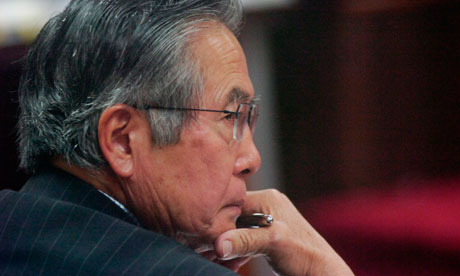Fuente: The Guardian
Por: Dan Collyns
A row over amnesty for those accused of atrocities during the Shining Path insurgency will not help national reconciliation

Daniel Mora, Peru's new defence minister, has been plunged quickly into hot water over a stray comment that seemed to suggest he favours a blanket amnesty for former or current members of security forces accused of human rights crimes during the country's bloody Shining Pathinsurgency.
"There has to be a cut-off point for the reconciliation of the country," Mora told Ideele radio in Lima, adding that judicial proceedings against members of the military and police for human rights crimes could not go on forever. "Cut-off point? This smells of Rafael Rey," said Daniel Abugattas, a surprised leading member of Peru's governing party upon hearing Mora's remark. Rey, a rightwing former defence minister and numerary member of the Roman Catholic sect Opus Dei, is considered by many to be the main apologist for atrocities committed by military and police forces in Peru's bloody internal war in the 1980s and 90s. In 2003, Peru's Truth and Reconciliation Commission estimated that 69,280 people were killed in those two decades, a figure Rey hotly disputes. Rey represents almost everything that Abugattas and the new leftwing administration of Ollanta Humala abhor.
Mora's comments have attracted a flood of opprobrium from human rights groups. The Washington Office on Latin America (Wola) said his remarks were tantamount to calling for a state policy of impunity. Ronald Gamarra, one of the prosecutors in the internationally lauded trial of the former Peruvian president, Alberto Fujimori, called for the minister's resignation and a Facebook page, which mimics Mora's misguided remarks, calling itself "Put an end to minister Daniel Mora and let's stop impunity" has close to 2,500 followers.
It is certainly not the first time a politician – in Peru or elsewhere – has put his foot in his mouth, and then said the remarks were misinterpreted. But Mora has just pushed himself further into the fray: by saying the atrocities and abuses committed by the armed forces were isolated excesses, he has entered into one side of the debate.
On the other side are those who say the massacres were part of a deliberate counter-insurgency strategy backed from the very top. Former president Fujimori was convicted of masterminding such a strategy. In April 2009 , he was jailed for 25 years for authorising 25 death squad killings. The trial was praised by Amnesty International as a "milestone in the fight for justice". The death squad in question, the "Colina Group" and other high-ranking officials in the Fujimori government (1990-2000) were also recently found guilty of the murders of 15 people and the forced disappearances of 10 others.
But for the most part, the wheels of justice move slowly in Peru. In September last year, the former leader Alan Garcia succumbed to pressure to pass a thinly veiled amnesty law to benefit indicted army officers. He quickly retracted it as Peru's only Nobel laureate author Mario Vargas Llosa attacked the measure in a sharply worded open letter. Meanwhile, the relatives of an estimated 15,000 disappeared are still waiting for restitution of their remains and the dimmer prospect of justice.
Twenty-five years on, Telmo Hurtado, an ex-army officer who led one of the most infamous massacres of 69 men, women and children in the highland village of Accomarca, is finally in custody in Peru after beingextradited from the US. But hundreds more former military and police officers have yet to be put on trial.
International Day of the Disappeared was on 30 August. In Ayacucho – the Andean region at the heart of the political violence between the Maoist Shining Path rebels and state forces – widows and bereaved mothers commemorated the day by displaying an enormous scarf made up of individual knitted or embroidered epitaphs to missing loved ones the "scarf of hope" is close to a kilometre in length.
Despite pressure from human rights groups, Peru continues to be one of the only Latin American countries not to have signed the 2006 international convention for the protection of all persons from enforced disappearances. Peru's creaky justice system threatens to collapse under the weight of prospective human rights prosecutions. A symbolic gesture is perhaps needed but Peruvian society is still deeply divided about its recent history. Swifter justice and a gesture of contrition by the state would go much further towards a national reconciliation than misguided talk of an amnesty.
Link: http://www.guardian.co.uk/commentisfree/2011/sep/09/peru-amnesty-shining-path-insurgency
Hi! I know this is kinda off topic but I was wondering which blog platform are you using for this
ResponderEliminarwebsite? I'm getting fed up of Wordpress because I've had problems with
hackers and I'm looking at alternatives for another platform.
I would be fantastic if you could point me in the direction of a
good platform.
Here is my homepage - GHD Straighteners NZ
Just desire to say your article is as amazing. The clearness for your submit is just excellent and that i could think
ResponderEliminaryou're an expert in this subject. Well together with your permission allow me
to take hold of your feed to keep up to date with
drawing close post. Thanks 1,000,000 and please keep up the
rewarding work.
Here is my website; Louis Vuitton Outlet Store